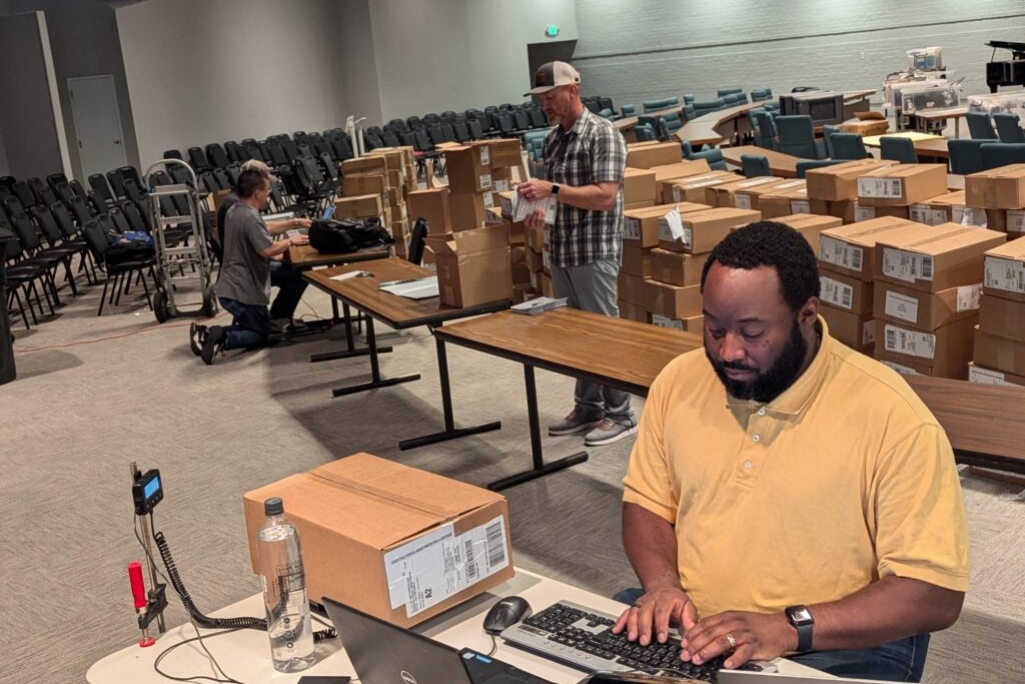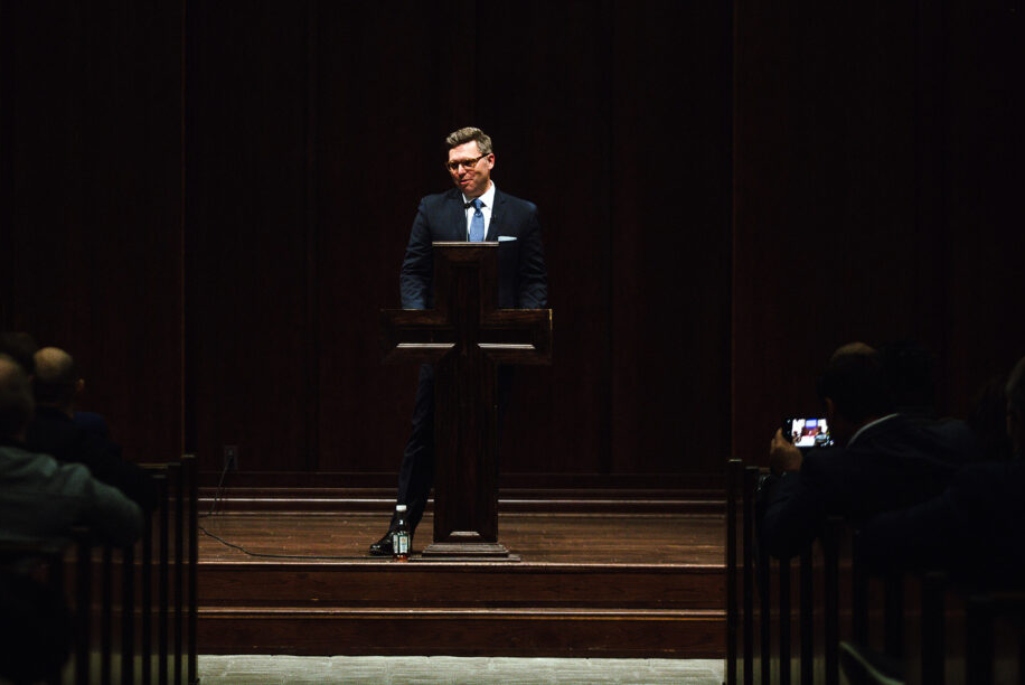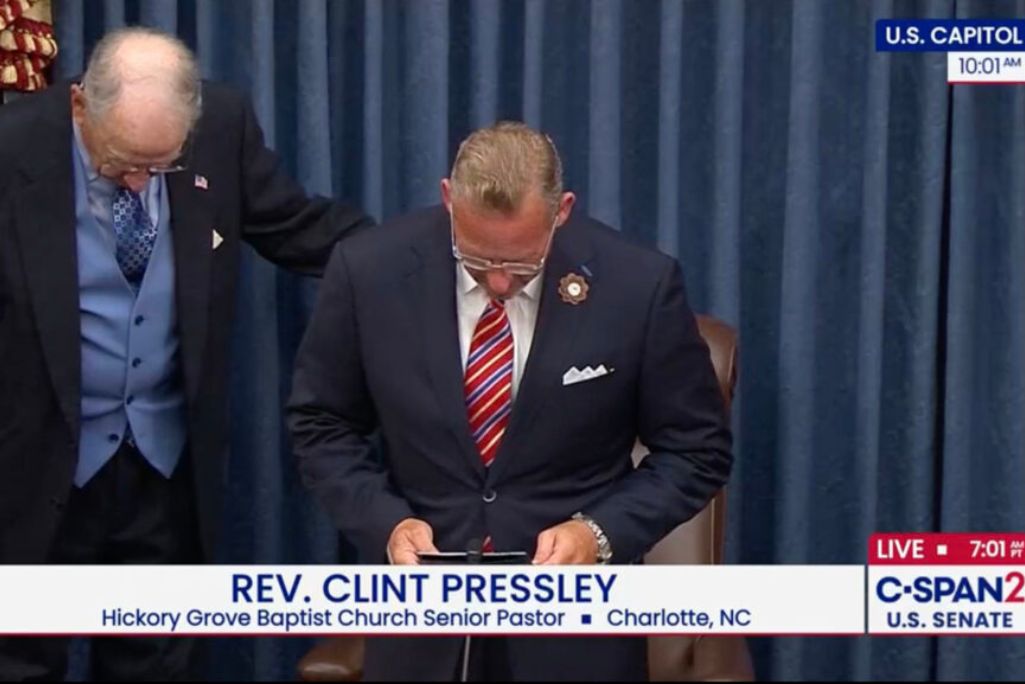
Former ARITF member Jon Nelson (foreground) gets a printer set up to print labels for shipments of the "Essentials" abuse prevention curriculum going to each state convention.
NASHVILLE (BP) — The auditorium in the Southern Baptist Convention (SBC) building in Nashville has been turned into a makeshift shipping center this week as former members of the SBC’s Abuse Reform Implementation Task Force (ARITF) box up thousands of copies of a curriculum they produced and ship them to Baptist state conventions around the country.
Group members Josh Wester and Brad Eubank sit at a laptop, calculating the number of units to go to each state. Member Jon Nelson sits at a table across the room setting up a label printer. Members Kris Buckman and Kelley Lammers are working on a letter to include in each shipment.
Even though the group has finished its official assignment from Southern Baptists, members said they couldn’t leave unfinished the job of getting the material to churches.
“Essentials: Sexual Abuse Prevention and Response,” a comprehensive plan for churches to implement abuse prevention protocols and care for survivors, was already put in the hands of thousands of church leaders at the SBC annual meeting in Indianapolis. But the demand has only grown.
The response so far from churches and local leaders has been “overwhelming,” said Eubank, pastor of First Baptist Church in Petal, Miss.
“What we hear from churches is ‘This is what we’ve needed. This is what we wanted. This is what we’ve asked for,’” he said.
Immediate response, immediate needs
Eubank told the story of one young woman who came to the ARITF’s space in the exhibit hall at the annual meeting. The woman was in the middle of a stressful time at her own church, dealing with an abuse-related crisis.
“She came to the table on Sunday. I was there. She got the curriculum,” Eubank said. “She went that night, went through the whole curriculum that night in her hotel, came back the next day and she wept. She said, ‘I literally cried as I went through this material thinking, “Oh to God if I’d only had this six months ago.”’”
Wester shared about another church leader who visited the group in Indianapolis who initially had a different reaction. Wester hesitated to share the story because he said it sounds unbelievable.
“They basically thought that [the curriculum] was well-intended but unnecessary, and they walked away,” Wester recalled. Later that day, the same person came back to the booth.
“They said, ‘You’re never going to believe what just happened. We just got this call about a situation in our church.’ And they picked up copies of the curriculum.”
Flexible resource, flexible access
The ARITF completed its final one-year term after its report to messengers. Since the group no longer exists in an official capacity, storing and filling orders for the remaining copies was posing a problem. Task force members decided to come to Nashville on their own time to get the curriculum shipped out to the states.
“We originally printed 20,000 copies of all of our material knowing we wouldn’t give it all out [at] the convention,” Eubank said. “We handed out about 8,000 thumb drives at the convention. So we’re taking what’s left over and then dividing that and giving percentages and trying to give as many to our state conventions as we possibly can.”
Each shipment includes copies of the book, thumb drives containing the materials and brochures that provide an overview.
The material is also available for anyone to download here. The group has been encouraged by the nearly 2,000 downloads so far.
Eubank said some state conventions or local associations may wish to print copies for every church, but added that it isn’t necessary due to the curriculum’s flexibility.
“That’s the beauty of it,” he said. “The booklet is a standalone piece if they want it to be. The videos, if they want them to be, are standalone. The thumb drive has the videos and the training for people who don’t have internet. And then the website has all of those same things together. So it’s designed to be multifaceted to cover every possible way to get it to people.”
Any church, anywhere
Jonathan Howe, SBC Executive Committee vice president for communications, commended the group’s work and commitment to the task.
“I’m thankful for the tireless work the ARITF has put in over the past couple of years to educate and inform Southern Baptists on these issues,” Howe said. “It takes leaders at every level of the convention working together for us to make a sustainable impact.
“Providing this curriculum and video resource from the national level to the state and local levels is a significant step toward sexual abuse prevention and awareness in our convention regardless of church size or budget.”
Eubank said the material was designed for the normative-sized church, often without even a full-time staff person. Such churches lack the financial and human resources to create a plan from scratch. Yet, those leaders still have a strong desire to protect their people.
“What we hear from pastors is when they find themselves in crisis, they want to do the right thing,” he said. “They don’t want to hurt people.
“’We don’t want to make the situation worse,’” Eubank said he hears from pastors. “’We want to respond correctly. We want to represent the name of Christ well. But we don’t always know how to do that.’ When you put something like this in their hand, all of a sudden they go, ‘Oh, well I can do that.’ This makes sense. This step-by-step process helps them.”
At the 2024 SBC annual meeting, messengers approved a recommendation tasking the SBC Executive Committee with recommending a structure adequate to support the creation of a permanent home for abuse prevention and response in the SBC.
(EDITOR’S NOTE — Laura Erlanson is managing editor of Baptist Press.)


